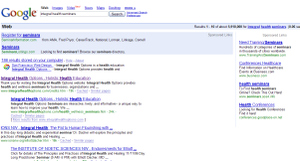This week clients have asked about our pay-per-click advertising services, and the questions were good ones. Here are my answers:
Q: What is pay-per-click?
A: Pay-per-click online advertising, or PPC, is paid text advertising in search engine results. On Google they are called "Sponsored Links" and on Yahoo! "SPONSOR RESULTS."
Businesses with websites purchase keywords-- the terms a customer would use to try and find their product or service-- and only pay when a visitor clicks on the listing. (It doesn't get much more 'targeted' than that.) The cost of each click is determined by competitive bidding, and prices range from a dime (.10) to over $13.00.
Small and medium-sized businesses getting started in PPC should budget $750 - $2,500 per month for a 3 month trial campaign, evaluate results and adjust accordingly.
Q: What does my business need to do to get started?
A: My experience has shown there are 3 keys to an effective PPC campaign
- A fantastic website
- PPC advertising will drive qualified leads to your site. What will they find when they get there? A clear, professional design? Compelling copy? Testimonials from your elated clients, and an easy way to request a quote? Driving traffic is half of the equasion, and converting visitors into leads is the other half.
- The right keywords and ad copy
- research tools from the PPC advertising platforms are great
at helping identify who your competitors are online and seeing how much
traffic you might expect-- and at what cost. You only get 65 characters per line in Google's PPC program so your message better be just right. Ad copy will make the difference between a prospect clicking on your ad or the other other guy.
- A resource to manage your campaigns
- There is one PPC platform for Google and a second for Yahoo!, MSN and AOL. Plan on managing your bid prices daily to start and 3 days/week moving forward.
Q: What's the ROI?
A: The return on the PPC investment is going to vary, but because it's so targeted it's easy to measure. You'll know how many clicks you're getting each month, and if the people on the phones (and email) are asking prospects where they heard about you you'll get an idea of ROI.
In the service sector, where a new customer or project could amount to $2,000, $10,000 or more the return is easy to see. 1 new project pays for the campaign for the whole month-- maybe for half-a-year. If your company sells prodcuts and an average ticket is $350, let's say, then we can easily calculate a break-even point.
The bottom-line: I like PPC. Wheel Media is creating PPC campaigns for our clients, training them on the management, and helping evaluate results. This is the most effecient, not to mention affordable solution for small business. Is PPC a better choice than search engine optimization? it depends on your business and where your customers are.
It's worth a serious look
--
Return to Leverage Blog homepage: small business blog >>
 Great new article in Forbes about how to hire a firm to optimize (i.e., SEO) your site for the search engines. Here's an excerpt:
Great new article in Forbes about how to hire a firm to optimize (i.e., SEO) your site for the search engines. Here's an excerpt:










